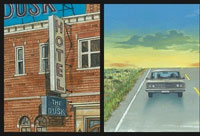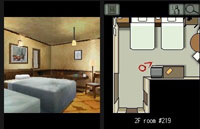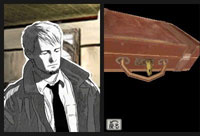
Hotel Dusk Review 52
The visceral nature of pure gameplay is hard to argue with. Games that are 'pure fun', like Geometry Wars or Burnout, satisfy gamers on the most basic level. Sometimes, though, you don't want to be completely engaged. You don't want to be on the 'edge of your seat'. Sometimes, really, you just want to read a book. Hotel Dusk is a 'visual novel', a common game genre in the nation of Japan. Here, it's one of the few titles ever to reach our shores. From an American perspective, it's an adventure game with less of an emphasis on clicking; the designers really just want you to read. Not only does this end up working really well as a concept, Dusk is a really good book. Interacting with extremely memorable characters, puzzling out the pulp-noir detective story, and playing with the DS sideways - all highlights of a stay at the Hotel Dusk. Read on for my impressions of this most welcome addition to the DS library.
- Title: Hotel Dusk: Room 215
- Developer/Publisher: Nintendo
- System: DS
- Genre: Adventure (Visual Novel)
- Score: 4/5 - This game is above average, and excels in the genre it supports. A classic for the genre, likely to be a part of a genre fan's collection, and well worth a look for every gamer.
Kyle is the fulcrum for the whole story, the plot turning as he turns and deepening as he digs. A former New York City police officer, now a door-to-door salesman, Hyde simply cannot let go of the past. His former partner is an undercover cop gone bad, on the road and out of sight for years. Using his role as a salesman as cover, Hyde works to track down the stain on his past and come to some kind of peace. Though that's the general outline of the game's plot, within that framework there are a number of smaller stories playing out in the dusty hallways of the hotel. Folks from Hyde's past reconnect with the ex-cop, while struggling with their own issues and mysteries. What's the tale behind the mouthy little girl on the stairway? What about the pretentious starlet across the hall? Who wrote a love note to the manager of the hotel, and why does the scuzzy-looking bellhop seem so familiar?
When you first check in, the manager places you in room 215. Every room has a word associated with it, meant to inspire guests staying under the hotel's roof. Room 215 is the 'wish' room - a prophetic choice for a tortured protagonist with many different goals. Those goals, broken down by chunks of time, make up the chapters of the game. From 5:30 - 6pm, say, you might be looking for some objects for your boss. After 6 you're looking to get some dinner. Though the game doesn't always do a great job of making you clearly aware of what you're working on, your sweeping goals can always be broken down into a few short-term steps.
Many of those goals revolve around finding and speaking with someone. Locating a person in a not-very big hotel is sometimes easy, and sometimes not. Hotel guests have specific rooms, of course, but they're not always available for you to chat with. In certain circumstances characters are in non-standard locations, requiring you to try formerly-locked doors to see if you've been given access to a new part of the hotel. This can make for frustration if you're not expecting it, as you search all the main areas of the hotel repeatedly ... only to find the bellhop hiding in the linen closet.
Actually navigating the hotel is a breeze: the touchscreen or d-pad serves to move kyle around the 3D environment of the hotel. The touchscreen acts as a top-down map, while the display screen shows you the full rendering of your surroundings from Kyle's viewpoint. When you get close enough to something or someone to interact with them, a context sensitive button begins to flash. Drilling down into the 'interactive' space, your touchscreen becomes a more detailed representation of the area around you. There you can use your stylus to poke at the furnishings and objects of the hotel. As with every adventure game, there are plenty of objects lying around that have no plot value whatsoever. Kyle still comments on these with a dry wit. When examining a sink, for example: "Just your basic sink. I have one just like it at home." These canned responses usually have one or two variations as well, ensuring you're never quite sure what Hyde will say at any given time.
This interactive screen is also where the light puzzling aspects of Hotel Dusk are played out. These challenges are almost all fairly easy, and usually involve using an item you've found in the hotel to manipulate something in the game world. A crowbar allows you to lift up a heavy file cabinet, for example, while a thick piece of wire helps you to pick a briefcase lock. Problem solving is the watchword to these puzzles, and as long as you've kept your eyes open they won't pose much of a problem.
While these puzzles are a nice occasional change of pace, your primary goal will be to talk with the other guests of the hotel. Every one of them has a story to tell, and following the threads of conversation will lead you (eventually) to the heart of their tale. Certain statements the other characters make will allow you the opportunity to interrupt and ask questions. Asking the right questions can net you still more questions, with scrolling text and a perplexed look on Hyde's face being a giveaway that this is important information. It is possible to screw something up during these conversations, derailing your investigation so badly that a crucial character grows to hate you. In such a circumstance you'll see the dreaded 'game over' screen, but continuing takes you right back to the start of the conversation. It's very hard to 'lose' Hotel Dusk - as a visual novel, it's really an attractive book with lots of pictures.
Though the environs of the hotel look nice enough, it's these character-to-character conversations that show off the most attractive part of Hotel Dusk. Character portraits are the mostly the still images seen in anime-style games like Phoenix Wright and Trauma Center, but the noir setting allows for a slightly different approach. Instead of an anime sensibility, characters are artfully rendered pencil line drawings. They also move, reaching to pick up objects or stroke their chin. These portraits are usually in black and white, allowing for some interesting and subtle color-based clues. You know you've got someone on the run, conversationally, when a wave of red emotion passes over them. People Hyde cares for will be rendered in full color, giving you an understanding of the protagonist's emotional state. It's a terrific, very low key visual approach that works wonderfully for this game.
Calling Hotel Dusk a game could reasonably be argued as inaccurate. It is, in true Japanese style, more book than game; it has more in common with Dashiell Hammett's novels than with a Kirby title. Calling Dusk a gimmick, though, would be underselling its value as entertainment. Everything about it - from the sideways position of the DS, to the rich conversational text, through to the artful line drawings, evokes a mood that inarguably works. In my view Hotel Dusk is a great game, because the term 'game' should be as broad as we can possibly make it. The adventures of Kyle Hyde are gripping, thoughtful, and a welcome alternative to the sometimes-vapid intellectual content of videogaming. Adventure game fans, mystery lovers, and everyone that you bough Brain Age for is going to appreciate this title for what it is: a book in game's clothing and a welcome addition to the DS worldview.



Re:Zork and other Infocom games past (Score:3, Insightful)